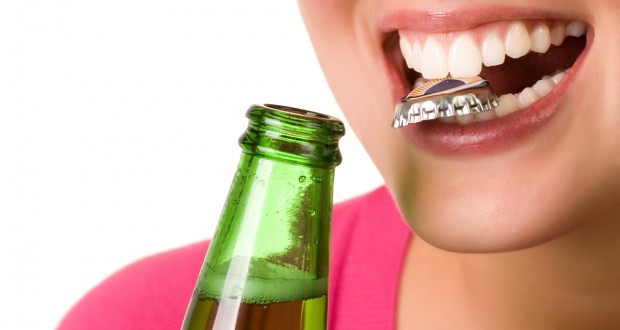 Although all dental problems are necessarily preventable, there are some that are certainly caused, at least in part, by bad oral habits. Ensuring that you utilize good oral habits rather than bad ones could prevent you from getting some of the dental problems associated with bad oral habits later on.
Although all dental problems are necessarily preventable, there are some that are certainly caused, at least in part, by bad oral habits. Ensuring that you utilize good oral habits rather than bad ones could prevent you from getting some of the dental problems associated with bad oral habits later on.
What are Bad Oral Habits?
Bad oral habits are those habits that individuals engage in, usually on a daily basis, and that can eventually lead to dental problems in the future. Examples of bad oral habits include not brushing or flossing teeth enough, eating too many sweets too frequently or even using the teeth to open a bag or chips or other packages. All of these habits and more can eventually lead to the development of dental problems in the future, some of which might could have been avoided completely had the individual not engaged in bad oral habits.
Health Problems Associated with Bad Oral Habits
Bad oral habits end up leading to bad oral hygiene over time, some of which manifest themselves in the form of bad breath, dry mouth, tooth discoloration, cavities, red or swollen gums, periodontal disease and eventually tooth loss. Additionally, bad oral habits could lead to tooth pain and even end up affecting patients’ overall healthy by causing them stress, self-confidence issues and other issues.
Is It Hard to Break Bad Oral Habits?
 It’s important to break any bad oral habits once individuals realize they have them. While breaking bad oral habits isn’t necessarily easy, it can be done by taking conscious efforts to do so. In many cases, bad oral habits aren’t something that developed overnight. Rather, they snowballed from the effects of slipping on brushing and flossing teeth as often as one should and so on. Focus on replacing bad oral habits with good ones in order to break them. For instance, instead of using teeth to open a bag of chips, keep a small pair of scissors handy to do the job.
It’s important to break any bad oral habits once individuals realize they have them. While breaking bad oral habits isn’t necessarily easy, it can be done by taking conscious efforts to do so. In many cases, bad oral habits aren’t something that developed overnight. Rather, they snowballed from the effects of slipping on brushing and flossing teeth as often as one should and so on. Focus on replacing bad oral habits with good ones in order to break them. For instance, instead of using teeth to open a bag of chips, keep a small pair of scissors handy to do the job.
Good Oral Habits
Some good oral habits all individuals should practice include brushing teeth at least twice a day, if not after every meal, visiting a dentist at least twice a year for an exam and professional cleaning and flossing daily. The longer individuals let food particles sit on their teeth, the more time the particles have to grow bacteria that leads to infection and bad breath. This is especially true of carbohydrates and sugar foods. Some dentist suggest rinsing the mouth with water after each meal or snack to decrease the amount of particles that stay on the teeth.
Eating properly is also important because having the appropriate diet leads to the healthy development and maintenance of teeth. Teeth are bones, so they need calcium. Try to get at least three daily servings of calcium as well as plenty of servings of fruits and vegetables, which are high in water content.
References:
J B Garde, Professor & Head, Rajendra K Suryavanshi, Professor, Bhushan Arun Jawale, Reader,Vikramsingh Deshmukh, Reader, Dattaprasad P Dadhe, Reader, and Maneesha Kshirsagar Suryavanshi, Senior Consultant. “An epidemiological study to know the prevalence of deleterious oral habits among 6 to 12 year old children.”Retrieved on October 14, 2015, http://www.ncbi.nlm.nih.gov/pmc/articles/PMC3959135/.
National Center for Biotechnology Information
U.S. National Library of Medicine
8600 Rockville Pike,
Bethesda MD, 20894 USA
http://www.ncbi.nlm.nih.gov/
Images:
https://farm6.staticflickr.com/5523/14542834865_851d532b52_z.jpg
https://farm1.staticflickr.com/494/19408761895_1d7ebcdf7e_z.jpg